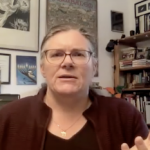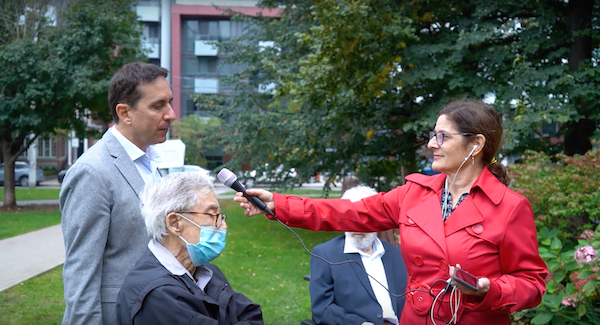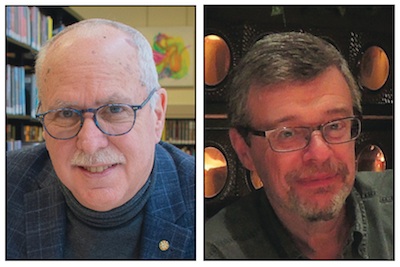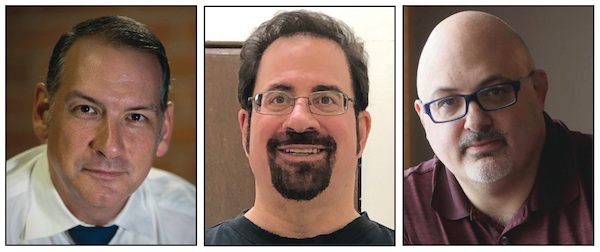Editors from three Canadian Jewish publications gathered on May 11 for a wide-ranging and passionate online discussion about the state of Jewish media in the country.
Yoni Goldstein of the Canadian Jewish News, based in the Toronto area, Bernie Bellan of the Jewish Post and News in Winnipeg and Cynthia Ramsay of Greater Vancouver’s Jewish Independent examined such topics as the economic viability of Canadian Jewish media, antisemitism, and the ability to balance an array of differing opinions within the community. All three publications have a long-standing history of Jewish journalism, with the Post and News and the Independent able to trace their beginnings to 1925 and 1930, respectively. (Though the JI started as a mimeo in 1925, the newspaper began five years later.)
Goldstein led off by explaining the recent manifestation of the CJN, which, founded in 1960, is the baby of the group. The paper closed in mid-2013 and again in April 2020, but reopened each time. The current version restarted in January 2021 with a reduced staff and a focus on online media.
When introducing his paper, Bellan noted that the Post and News readership skews to an older demographic yet endeavours to be as inclusive as possible. “With the advent of the internet, there are so many different news sources that it is hard to establish a clear identity for a lot of Jewish media,” he said. “You have to change with the times and know your audience.”
Ramsay, too, addressed the fine line between keeping established readers interested and also bringing in a younger audience. “We celebrate Jews in the community whether or not they are doing something specifically Jewish. We want to look forward and also respect the past. We try to be a window to the world and not be too insular.”
Moderator Bryan Borzykowski, the president of the CJN, next pressed the panelists on staying relevant in an age when connections to Jewish organizations are waning.
“One of the positive sides of the digital age is that you can dive in and see what sorts of stories people are engaged in,” Goldstein responded, highlighting the numerous subjects CJN offers in its podcasts, from politics to arts, sports to humour.
Bellan said he features newcomers to Winnipeg in his paper, whether they are from Russia, Israel or elsewhere in Canada. “We want them to know that the established Jewish community welcomes them and we want them to feel integrated in the community,” he said.
“As long as you are writing a paper that is in this moment and not dwelling on the past, then you are relevant, and your readers will decide that,” said Ramsay.
Borzykowski asked about revenues, particularly during a pandemic, which has challenged further the solvency of media in general.
“Most of our money still comes from advertising. For now, it is great because we are small, lean and we are able to ‘pivot’ quite easily. I don’t have to get OKs to do anything. And our community has been very supportive,” Ramsay said.
For the CJN there are three money planks, according to Goldstein: advertising, subscriptions and donations. The publication hopes to be able to provide tax receipts to donors in the future.
Bellan credited a loyal local subscriber base and an attachment that former residents of Winnipeg have towards the city as reasons that place his paper in an enviable position when it comes to sustainability. “There are probably more Jewish ex-Winnipeggers in the world than there are current Jewish Winnipeggers,” he noted.
Balancing the range of opinions readers have on issues, such as Israel, was the next phase of the discussion. Ramsay welcomes a diverse selection of views on the Jewish state, with the ground rule being the recognition of Israel’s right to exist. “We had to bring the readership along to the concept that you don’t have to be afraid if someone does not agree with you on Israel,” she said.
Goldstein brought attention to the number of reputable publications based in Israel, which, from the CJN’s perspective, would not be worth competing against. Instead, when the publication does run an Israeli story, it will likely have a Canadian connection, he said.
Bellan’s Post and News presents a vast spectrum of views on the Holy Land, from running pieces by a Palestinian scholar to a hawkish opinion writer, and Bellan stated that differing views on topics can contribute to the vibrancy of a publication.
When questioned about reporting on antisemitism, Goldstein said it could be seen as one of the key reasons for the existence of Jewish media in that it will cover the topic in a more sensitive and journalistically appropriate manner than the mainstream press.
Bellan said his paper has taken note of the recent increase in antisemitism, especially in universities, and has published a lot more articles on the subject of late.
Ramsay emphasized that, while acknowledging and dealing with the topic of antisemitism, the Independentdoesn’t write from a position of fear or panic, but rather one of pride in celebrating Jewish identity.
No present-day conversation of modern media would be complete without the mention of “fake news” and what responsible publications can do to prevent it.
“The challenge is to build trust with audiences,” Goldstein said. “You have to build your reputation as being honest and rigorous in your reporting.”
In Winnipeg, the anti-vaccine movement became a problem for Bellan as his main columnist is one of its adherents. Bellan’s response was to counter with facts and chronicle his own battle with COVID-19 without denying anti-vaxxers space in his paper.
Ramsay stressed the importance of fact-checking and sourcing material while, at the same time, providing room for as many views as possible. That said, she said she does censor material, such as that from anti-vaxxers, which could harm public health.
Borzykowski ended the evening by noting that the CJN is a national paper and touching on the possibility of collaboration between the CJN and local Jewish newspapers across the country.
Congregation Etz Chayim in Winnipeg hosted the event, with Monica Neiman supplying the technical support.
Sam Margolis has written for the Globe and Mail, the National Post, UPI and MSNBC.








